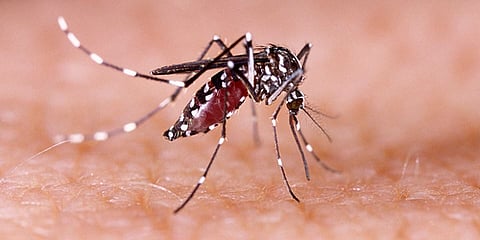

BENGALURU: The Karnataka government on Tuesday declared dengue fever, including its severe forms, as an ‘epidemic’ disease across the state. To control the spread of dengue and other vector-borne diseases, the government has amended the Karnataka Epidemic Diseases Regulations, 2020, introducing strict measures for mosquito control.
An epidemic refers to a sudden and widespread occurrence of a disease within a specific geographic area. This means that the dengue outbreak has reached a level that necessitates urgent and coordinated public health measures to control its spread and impact. The change allows for the implementation of stricter regulations and enforcement actions to mitigate the disease's prevalence and prevent further cases.
The new regulations require every owner, occupier, builder, or person in charge of any land, building, water tank, park, playground, or any other place to take necessary steps to prevent mosquito breeding.
Specific measures include ensuring that water storage containers, sumps, or overhead tanks are covered, disposing of solid waste to prevent water accumulation, and avoiding the storage of empty vessels, cans, unused tires, or any items that can collect water. The regulations also mandate that any unused tanks, pits, or burrows where water might collect be managed to prevent mosquito breeding.
The competent authority, which includes the Chief Commissioner of BBMP for the Bengaluru area and the Deputy Commissioners for other districts, has been given the power to inspect premises, issue notices, and enforce compliance.
These authorities can enter and inspect any property between sunrise and sunset with prior notice and can require the owner or occupier to take immediate measures to eliminate mosquito breeding, such as using physical, chemical, or biological methods. If a person fails to act within the specified time, the authorities can undertake the necessary actions themselves and recover the costs from the defaulter.
Penalties for non-compliance are set based on the type and location of the property. For households, the fines are Rs 400 in urban areas and Rs 200 in rural areas. Commercial establishments, including offices, schools, colleges, healthcare facilities, hotels, and other such places, will face fines of Rs 1,000 in urban areas and Rs 500 in rural areas. Active or abandoned construction sites, as well as vacant lands, are subject to fines of Rs 2,000 in urban areas and Rs 1,000 in rural areas.
In areas governed by the BBMP and Mangalore City Corporation, the prescribed penalties will prevail. Additionally, if non-compliance continues after a notice is issued, an extra 50% of the total fine amount will be charged for each week of continued violation. The competent authority or its authorised officer is responsible for levying and recovering these fines, ensuring that all regulations are strictly followed to prevent the spread of dengue in Karnataka.